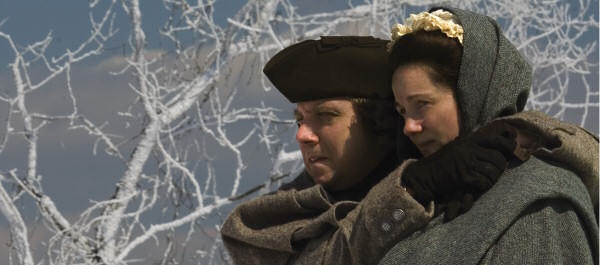Kirk Ellis Interview on HBO’s John Adams

ACG/HN: How closely does the miniseries follow David McCullough’s Pulitzer Prize–winning book, on which it’s based?
KE: I think all of us—(director) Tom Hooper, (production designer) Gemma Jackson, all of us—wanted to be as scrupulous as we could in portraying the times. It’s often not what you’ve included but what you’ve excluded. In terms of Jefferson and Adams and who they were, I think we’re pretty true to David’s book.
One thing (executive producer) Tom Hanks made very clear was that we were not just doing John Adams, we were doing David McCullough’s John Adams, which means we would always be favoring Adams’ own view of things. We would portray Franklin, Jefferson and the others though Adams’ perspective.
{default}
ACG/HN: Other than using McCullough’s book, what kind of research did you do to script the miniseries?
KE: My bibliography is about 50 books, all of Adams’ political writings, his letters with Abigail and Jefferson. I read The Age of Federalism and social histories of the time and looked at a great deal of engravings and etchings and landscapes of Boston and Philadelphia.
I also read the same books John and Abigail read. Those provided a real window into people’s language and helped greatly to find an idiom that was not anachronistic but didn’t sound artificial. Literature of a period is a close approximation of how people spoke. An American traveling in London in this period might not be taken for an American, nor would an Englishman traveling in America be taken for English. We know that is true because that is what a visitor from England wrote. People still used the King’s English, used complex thoughts and spoke in complete sentences.
I’m proudest of this aspect of the miniseries. It is hard to tell where the words of Washington, Adams, etc. break off and my words begin.
ACG/HN: The love story of John and Abigail Adams is as central to this miniseries as John’s political activities are. Their relationship within their marriage was unusual, especially for their era. What you think the basis was for their strong partnership?
KE: There are two stories running parallel, the political and the personal. Their marriage would still be a remarkable one in our so-called more advanced society.
They had a deep, deep love and passion that they continually reaffirmed despite separations. It was a remarkable intellectual and emotional partnership. Adams wrote, "Is there any way for two souls separated by 300 miles to be reunited? I want to see you think." It speaks volumes about how much he respected her intellect. He realized she was a better judge of character than he was.
He called Abigail his ballast. When she was around, he rarely made a wrong step politically. When she was absent, he often put his feet in the wrong place.
ACG/HN: That is very obvious in the Paris scenes. My favorite scene is the one in which Franklin hands Adams American flags to pass out at a fundraiser among the French nobility. It is clear France’s upper class regarded American revolutionaries as radical chic.
KE: Ironically, the lyrics of the liberty song that is sung in the flag-waving scene in Paris were actually written by John Dickinson, who had opposed declaring independence from Britain.
The whole look of the film changes when Adams goes to France. The American scenes are restless, almost anarchic. The camera is handheld, frantic. In Europe things are more locked down. The old order holds sway.
This was an advantage to having Tom Hooper, who is a Brit, as a director. He brings a new perspective to American history. It never appears anything is staged for the camera. It’s as if the camera is recording what’s happening in front of it, very urgent in its presentation. It has an immediacy.
Franklin and Adams had in Paris what we in movie terms call "good cop, bad cop." I think Franklin used Adams’ behavior as a lever with the French to play into the hands of American diplomacy, sort of I’m patient, but I won’t wait forever; this is what you might have to deal with if you won’t give me what we want.
Adams was totally unsuited to French society. He would never have succeeded. Franklin realized they would get money by portraying Americans as bumpkins to entertain the French. Adams was almost pompous. He believed in a very direct approach, which backfired badly.
ACG/HN: In the miniseries, Abigail makes several anti-slavery and pro-feminist statements that viewers may think were added for twenty-first-century audiences. Did the real Abigail actually express such sentiments?
KE: John was the only one of the founders who did not own slaves, and he was passionately opposed to slavery. Abigail was a staunch abolitionist. She says to George Washington, "Do you think such punishment should befall us for the sin of slavery?" That’s straight from one of her letters.
When Franklin and Adams are editing Jefferson’s Declaration of Independence—that’s an actual historical scene—Franklin says, "The issue before us is independence, not emancipation."
Franklin did say that. He knew an antislavery sentiment in the Declaration of Independence would not fly. The Southern delegates would never have accepted its inclusion.
[continued on next page]


0 Comments
Trackbacks/Pingbacks